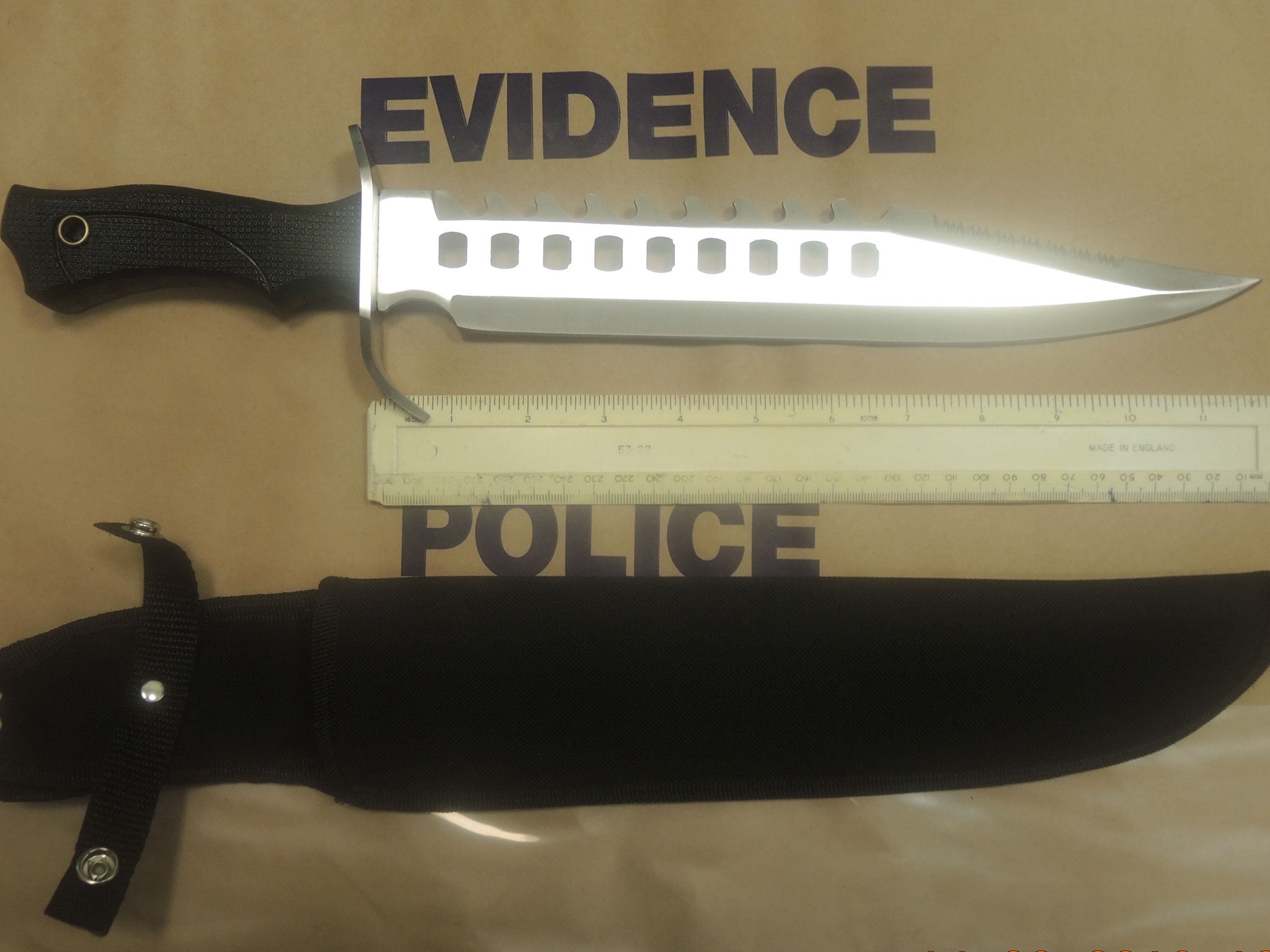Home deliveries of knives and acid to be banned in government crackdown
New Offensive Weapons Bill would also ban possession of knuckle dusters, zombie knives and 'death stars' in public or private

The delivery of knives and acid bought online to people’s homes will be banned under laws proposed by the government to tackle a nationwide rise in serious violence.
The new Offensive Weapons Bill aims to make it harder for young people to purchase deadly weapons and make the possession of knuckle dusters, “zombie knives” and “death stars” illegal – even in private.
Sellers will be required by law to impose rigorous age verification measures to prove that anyone purchasing blades or corrosives is over 18, or face prosecution.
The proposals would also make it a criminal offence to sell a minor a corrosive product, either online or offline, and to possess a corrosive substance in a public place.
The Home Office said it had listened to concerns raised by police officers, who have struggled to stop people suspected of carrying acid and seize liquids for testing under current laws.
Sajid Javid, the home secretary, said: “It is totally wrong that young people are able to get their hands on dangerous weapons such as knives and harmful acids. That is why we are making the laws around this even tighter.
“Earlier this week I saw the great work our frontline officers do to keep our communities safe – and I am determined to do everything I can to help them keep weapons off our streets.”

The government said the law, which was first announced in April but delayed by Amber Rudd’s resignation, allows exemptions from the home delivery ban for bladed items that cannot cause “serious injury”, are made to order, are used for sport or are for historical re-enactments.
Delivery companies transporting products to under-18s on behalf of sellers outside the UK would also be prosecuted under the proposals.
It will be illegal to possess rapid-firing rifles and “bump stock” devices of the kind used to massacre 58 people in Las Vegas last year, with owners of prohibited items allowed compensation.
An existing law banning possessing offensive weapons in schools is also being expanded to cover other educational institutions.
Violent crime has risen by 17 per cent across England and Wales over the past year, causing fierce debate over the underlying cause of a bloody wave of attacks.
More than 70 people have been murdered in London alone, where officials vowed not to “accept that this horrifying situation is the new normal”.
Steve O’Connell, chair of the London Assembly Police and Crime Committee, said: “We need to understand the reasons why our communities have become susceptible to this malign criminality.”
The new bill is part of the government response set out in its serious violence strategy, which was heavily criticised after leaks revealed that a Home Office document suggesting police budget cuts may have “encouraged” offenders was cut from the published version.
The document attributed increasing violence to factors including changes to the drug market and incitement on social media, while critics have pointed to the loss of 20,000 police officers since 2010 and cuts to youth services and mental health provisions.
On Tuesday, policing minister Nick Hurd told the Home Affairs Committee it was “too simplistic” to put the rise in violent crime down to a lack of police resources.
“I think the context has changed,” he added. “The police system has been very stretched in recent years and in light of the evidence in front of us, we have taken steps to put more resources in the system – £460m more this year, £1bn more than three years ago, and we intend to do something similar for the 2019-20 settlement.”
In a dramatic departure from his two predecessors, Mr Javid acknowledged that resources were “an issue” for struggling British police forces last month and vowed to fight for more cash in a government-wide spending review.
Yvette Cooper, the Labour chair of the influential committee, raised concerns that “across the board we are seeing more criminals getting away with it”.
She pointed at figures showing a drops in arrests, charges and summons for violent crime, robbery and sexual offences, which are all rising.
“Serious crime is starting to go back up and the number of crimes brought to justice is dropping,” Ms Cooper said. “It looks like the Home Office is not exercising its fundamental responsibility to keep people safe.”
Mr Hurd argued that the changing nature of crime and dramatic rise in the amount of evidence being examined from digital devices meant offences were taking longer to progress through the criminal justice system.
He said that moped-enabled crimes were already falling, thanks to government and police initiatives, and vowed to help forces work more effectively.
In the same session HM chief inspector of constabulary warned that criminals are adopting increasingly sophisticated tactics fuelled by their exploitation of modern technology.
Sir Tom Winsor told MPs the “complexity and volume” of demand is the biggest challenge for police, after criticising technology companies for letting terrorists, paedophiles and organised criminals conceal their activities.
Bookmark popover
Removed from bookmarks